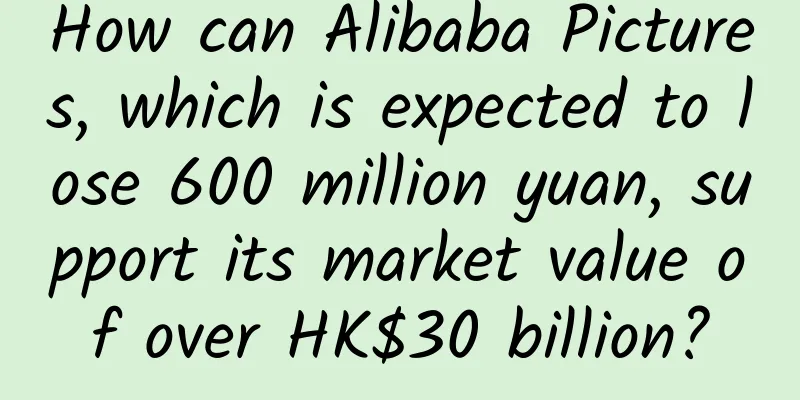How can Alibaba Pictures, which is expected to lose 600 million yuan, support its market value of over HK$30 billion?

|
Alibaba's plan to make movies has not been going smoothly. In March last year, China Culture Media announced that Alibaba would spend HK$6.24 billion to acquire a 60% stake, which means that Alibaba's valuation of China Culture Media is HK$10.4 billion. This is about double the market value of China Culture Media before the acquisition. However, after paying a large sum of money to buy a 60% stake in the company, Alibaba was not at ease. It soon discovered various financial problems in the company and launched an investigation. At the end of December last year, Alibaba Pictures announced that it had made an impairment provision of approximately HK$393 million, which directly led to a substantial loss. On January 26 this year, Alibaba Pictures issued its first profit warning since its establishment, saying that it might suffer a substantial loss of up to HK$600 million in 2014. In addition to financial problems, the company's original business before Alibaba took over also underwent various changes. It is reported that after Alibaba took over, many old employees of China Culture Media also resigned one after another. Dong Ping, former chairman of Alibaba Pictures, also sold 625 million shares at HK$1.5 per share on January 22, involving a capital of HK$938 million, and his shareholding dropped from 6.21% to 3.23%. But Zhao Wei and her husband are optimistic about the future of Alibaba Pictures. On December 20 last year, Zhao Wei and her husband bought 1.93 billion shares at a price of HK$1.6 per share, which was almost the highest price of Alibaba Pictures in recent months. The latest news is that CEO Zhang Qiang will also be deeply bound to this company. On January 28, Alibaba Pictures announced that Zhang Qiang would acquire 210 million shares of the company at a price of HK$1.67 per share. HK$1.67 is almost the highest price of Alibaba Pictures in recent months. Some netizens said that Alibaba Pictures is almost supporting a market value of more than HK$30 billion with a blank sheet of paper, which also means that if Zhang Qiang wants to profit from the capital market, he must lead Alibaba Pictures to fight hard. Alibaba falls into the "financial trap" of Cultural China Since 2014, Internet giants have successively laid out their plans in the film field. Tencent established Tencent Film+, Baidu established a film division, Youku and iQiyi established Heyi Pictures and iQiyi Pictures respectively... It is not difficult to find that most of these Internet companies are incubating film projects within their own companies, or establishing subsidiaries that focus on film. Unlike these companies that chose to develop organically, Alibaba directly acquired a listed company in Hong Kong, China Culture Media. In March 2014, Alibaba announced that it would acquire nearly 60% of China Culture Media’s equity by subscribing to new shares. China Culture is a film and television production company headed by Dong Ping, a "big shot" in the domestic film and television industry. The company invested in the 2013 domestic box office champion "Journey to the West: Conquering the Demons" and acquired a 30% stake in the project. It also has long-term cooperation agreements with many big names in the film industry, including Stephen Chow, Wong Kar-wai, Chen Kexin, and Chai Zhiping. Alibaba's high valuation of China Culture Media surprised many people in the industry. Alibaba invested HK$6.24 billion to subscribe to nearly 60% of China Culture Media's equity, which means that Alibaba's valuation of China Culture Media is HK$10.4 billion. Just one day before Alibaba announced its investment, China Culture Media's market value was only HK$5.34 billion, so Alibaba's valuation of China Culture Media is almost twice the company's market value. This company bought with a lot of money has not yet allowed Jack Ma to quickly develop the film business. In June last year, Alibaba completed the transaction and subsequently changed the company's name to Alibaba Pictures. It was not until January this year that Alibaba Pictures released its first project, "The Ferryman". On August 15 last year, Alibaba Pictures issued a suspension announcement stating that after the new management made a preliminary review of the financial and operating conditions, it found that "there may have been inappropriate financial treatments in previous accounting periods and there may have been insufficient provisions for asset impairment." The suspension lasted more than four months, and the stock was resumed on December 22 last year. During this period, Alibaba hired PricewaterhouseCoopers to investigate many financial problems of the company before it acquired a stake, dating back to December 31, 2012. Finally, Alibaba Pictures announced an impairment provision of approximately HK$393 million, which directly led to the company's substantial losses in the first half of 2014. The main reason for these impairments was that some subsidiaries had inappropriate tax payments and applicable tax rates when selling artworks, movies, and TV copyrights in the mainland. Asset impairment is only one of the reasons for Alibaba Pictures' substantial losses. Another reason is the delay in the company's original film and TV series distribution business. In January 2015, Alibaba Pictures announced that its full-year loss last year may have reached HK$600 million due to the postponement of the release of several TV series originally scheduled for release in 2014, the cancellation or postponement of several films originally scheduled for production and release last year, the downturn in the magazine industry and the changes in the operating team (China Culture Network also has the operating rights of "Le Figaro" magazine). Assets behind the market value of more than 30 billion The expectation of a substantial loss in performance led to a drop in Alibaba Pictures’ share price. Before it was suspended in August last year, Alibaba Pictures' share price had long been above HK$1.6 per share. However, after it resumed trading on December 22 and last January 22, the share price had been below HK$1.5. Until the recent news that Zhao Wei and her husband held shares, the share price rose to around HK$1.6. At the close of last Friday, Alibaba Pictures closed at HK$1.54. With such a share price, Alibaba Pictures' market value is HK$32.6 billion, equivalent to RMB 26 billion. If it is listed on the A-share market, it is already the third largest film and television company by market value, second only to Huayi Brothers and Enlight Media. A Hong Kong stock analyst told the Beijing News that the market value of HK$32.6 billion already ranks among nearly 10% of Hong Kong stocks, but Alibaba Pictures' business has not actually been fully operational. One shareholder said in an investor forum: "The only thing that supports Alibaba Pictures' market value of more than HK$30 billion is the imagination of Alibaba Group and the company's long-term cooperation agreements with several film and television giants." Before Alibaba took over, China Culture Media had signed long-term cooperation agreements with Wong Kar-wai, Chen Kexin, Chai Zhiping and Stephen Chow, and paid an advance payment of 50 million yuan to each of these four senior figures in the film and television industry. Because of this, Alibaba Pictures received an investment share in the hit movie "Dear" during the National Day holiday in 2014. The first project announced by Alibaba Pictures after the beginning of 2015, "The Ferryman", was produced by Wong Kar-wai. In addition, Alibaba Pictures’ assets also include the film adaptation rights for “My Fair Princess” and the overseas distribution rights for “Wolf Totem”. Zhao Wei, Zhang Qiang and Alibaba Pictures are “deeply bound” Unlike Dong Ping, the former chairman of Alibaba Pictures, who reduced his holdings, Zhao Wei and her husband, who have a good personal relationship with Jack Ma, invested in Alibaba Pictures. Alibaba Pictures received a huge investment of HK$3.1 billion from Zhao Wei and her husband, and the investment price was HK$1.6, which was higher than the closing price of HK$1.54 last Friday. In other words, Zhao Wei and her husband have already suffered a floating loss. In an interview with the media, Alibaba Pictures responded: "Since the shares have not been sold, the so-called depreciation is not a conclusion. Alibaba Pictures will have a series of big moves in the future, and Zhao Wei will definitely not lose money by buying our shares!" In the future, the person who may buy shares at a higher price than Zhao Wei may be the CEO of this company, Zhang Qiang. On January 28, Alibaba Pictures announced that it would grant 285 million stock options, of which 210 million were granted to CEO Zhang Qiang, and the stock options would be valid for 10 years. However, the price of this stock option is HK$1.67, which is higher than the current stock price. This also means that if Zhang Qiang wants to truly obtain capital gains from equity incentives, he must work hard to significantly increase the share price of Alibaba Pictures. Is the combination of “Alipay + China Film” reliable? Alibaba is injecting new blood into the company. An Alibaba Pictures employee told the Beijing News that the company has launched a large-scale recruitment plan, and almost all of the recruited employees are born in the 1990s, while some of China Culture's "old men" have quietly resigned. In an interview with the Beijing News, Alibaba Pictures CEO Zhang Qiang said, "The average age of our main moviegoers is 21.8 years old, which is very young, but the average age of our main directors may be the oldest in the world." In his view, film production staff must be younger. When choosing which films to invest in, Alibaba Pictures' principle is to "stay down to earth." Zhang Qiang said that since the main audience is young people who spend their time online, the movies, from actors to lines, must meet their aesthetic standards. "Sometimes I see some movies with lines that are very off-putting. Such movies are dangerous at first glance." The first film invested by Alibaba Pictures was not a big production, but a romantic comedy directed by best-selling author Zhang Jiajia. This investment approach seems to be imitating the success of Guo Jingming and Han Han in the film industry. In response, Zhang Qiang said that big stars and big directors are not a guarantee of box office success. In comparison, he is more willing to trust the sales, clicks, word-of-mouth and other data of popular literature. In the film distribution business, Zhang Qiang proposed to build the largest local network distribution team in the country. At present, this rumor has quietly fermented in the film industry. In the field of film distribution, Guangguang and LeTV are the two companies that do the best in local network distribution. The so-called local network distribution, in layman's terms, is similar to the promoters stationed in supermarkets by manufacturers. Their task is to help movies get a larger proportion of screenings in various theaters. Zhang Qiang said that this distribution team will be built by the original Alibaba B2B business backbone, and the number of people will reach 200 to 300 in the future, with one person responsible for 10 theaters. The tasks that Zhang Qiang assigned to these ground network teams are completely different from those of previous film distribution companies. In Zhang Qiang's words, it is to use Alipay's user data system to help cinemas develop Alipay users within 3 kilometers of the cinema into members. On the other hand, the ticketing systems of these cinemas will be "built" on the Taobao Movie platform in the future. Similar to what Alibaba did in the e-commerce field, Zhang Qiang wants to move the ticketing systems of all cinemas across the country to Alibaba Cloud; unlike existing online ticketing websites, Alibaba’s emphasis in the future will not be on selling tickets itself, but on connecting the systems to allow cinemas to sell movie tickets on the Taobao movie platform. In addition, Alibaba plans to build a free e-commerce platform for cinemas across the country. "When watching a movie, audiences can pay for derivative products by pointing their mobile phones at the screen, and then have them delivered to their doorsteps," Zhang Qiang said. "Since the profits are generated in the cinema, we share them with the cinema." Regarding such plans, a senior person from the top four domestic film companies said: "If these plans can be truly realized in Alibaba Pictures, then the company will have huge room for imagination, but this series of grand blueprints requires specific executors, and Alibaba Pictures still has a long way to go." A domestic person who has been engaged in cinema management for a long time told the Beijing News reporter that Alibaba owns the Taobao Movie platform and has a great advantage in online distribution. If it does a good job online, it will already have a strong persuasive effect on theater scheduling. The large local distribution team will certainly help to guide users, organize activities, etc., but for Alibaba, whether it is necessary to do such a large-scale offline distribution may also need to be considered. dialogue An interview with Zhang Qiang, CEO of Alibaba Pictures, on Jack Ma's love for movies Jack Ma encountered many setbacks during his entrepreneurial journey. He once said that it was the movie "Forrest Gump" that encouraged him to persevere. Since changing its name to Alibaba Pictures in June last year, the listed company has not officially announced its development strategy, but only released its first film in January this year. With a market value of more than HK$30 billion, Alibaba Pictures is already the third largest domestic film and television company by market value, second only to Huayi Brothers and Light Media. The future direction of this listed company has always been a topic of concern for many investors. In January this year, Zhang Qiang, CEO of Alibaba Pictures, accepted an exclusive interview with a reporter from the Beijing News. He said that Alibaba Pictures would build the strongest ground distribution team in China, serving not only cinemas but also moviegoers, and turning hundreds of millions of Alipay users into cinema members. Beijing News: Why does Jack Ma want to make movies? Zhang Qiang: Alibaba has emotional reasons as well as rational considerations in making movies. In terms of emotions, Mr. Ma encountered many setbacks in the process of starting a business. He once said that it was the movie "Forrest Gump" that encouraged him to persevere. This complex is very deep. Last October, Mr. Ma led a team to Los Angeles and went to the Paramount studio. He took a photo sitting on the chair that "Forrest Gump" had sat on. On the rational side, I had a deep conversation with Mr. Ma. He mainly focuses on the development space of the Chinese film market. In the future, this market will reach a scale of 200 billion. There is a lot of room for growth, but there are also many areas that need to be improved. We all agree that of the 200 billion market, box office accounts for only one third, derivatives account for one third, and pay-per-view accounts for another third. But apart from the box office, the other two areas are almost blank, and this blank is exactly what Alibaba wants to do. Beijing News: For online on-demand streaming, you once said that you would spend more than 6 billion yuan to purchase copyrights. Is that true? Zhang Qiang: There may be a misunderstanding in this area. It is not the listed company Alibaba Pictures that is doing this, but the Digital Entertainment Business Group under Alibaba Group. Alibaba Pictures and Alibaba Digital Entertainment are working together. Beijing News: In terms of filming movies and TV series, how is Alibaba different from ordinary film and television companies? Zhang Qiang: We will pay more attention to the aesthetic expectations of the younger generation of audiences, and the primary condition for using big data as a reference is extensive. We want to make movies that are most popular among young Chinese audiences, mainly focusing on three categories: The first category is fantasy movies, especially those represented by Hollywood blockbusters, which take visual effects to the extreme; the second category is local comedies with emotional resonance; the third category is youth love and nostalgia themes. In the future, we will focus on fantasy blockbusters and comedies. For fantasy blockbusters, the stories are domestic stories, and we can ask foreign teams to do the special effects. Our next movie will be Eternal Love, which is also a super bestseller. We attach great importance to the value of IP, which can be books, comics, or games. Beijing News: What are your requirements for subject selection? Zhang Qiang: What we want to do is something down-to-earth. I have always emphasized the word "down-to-earth". The main audience nowadays is young people, a relatively new, independent, distinctive and individual generation. This generation adapts to the impact of the Internet, and everything from actors to lines must conform to their aesthetics. Sometimes I see some movies with lines that are very off-putting, and such movies are dangerous at first glance. Beijing News: Alibaba Pictures has not publicly released its corporate strategy since its establishment, which has confused some investors. What will Alibaba Pictures do in the future? Zhang Qiang: We have three things to do: the first is the "O2O movie model", which is a movie model that combines online and offline; the second is to open up the e-commerce model in the film and TV series business; and the third is to make movies and TV series. Beijing News: Many companies are doing movie O2O, what makes Alibaba different? Zhang Qiang: In the past, we have seen that online distribution of movies was by Guevara and Maoyan, and offline distribution was by LeTV and Guangxian. In the future, we will have Taobao Movies online, and we will also build the strongest ground distribution team in China. In the past, Alibaba B2B had more than 10,000 strong troops, and our ground force was formed by drawing core members from B2B. There will be 200 to 300 people, and one person will be responsible for 10 cinemas. The support point of the market value of more than 30 billion Hong Kong dollars Long-term cooperation agreements with film and television celebrities: China Culture Network has signed long-term cooperation agreements with Wong Kar-wai, Chen Kexin, Chai Zhiping, and Stephen Chow. Market gaps: derivatives, pay-per-view Management is tied to the company: CEO Zhang Qiang will subscribe for shares Celebrity shareholders support: Alibaba Pictures receives huge investment of HK$3.1 billion from Zhao Wei and her husband "Alipay + China Film" combined strategic model As a winner of Toutiao's Qingyun Plan and Baijiahao's Bai+ Plan, the 2019 Baidu Digital Author of the Year, the Baijiahao's Most Popular Author in the Technology Field, the 2019 Sogou Technology and Culture Author, and the 2021 Baijiahao Quarterly Influential Creator, he has won many awards, including the 2013 Sohu Best Industry Media Person, the 2015 China New Media Entrepreneurship Competition Beijing Third Place, the 2015 Guangmang Experience Award, the 2015 China New Media Entrepreneurship Competition Finals Third Place, and the 2018 Baidu Dynamic Annual Powerful Celebrity. |
<<: Why is Windows making less and less money for Microsoft?
>>: WeChat launches a new round of ban on Alibaba Group
Recommend
Marketing planning and promotion: How to create Labor Day H5?
The May Day holiday is a hot topic, so brands cer...
Intel Mobileye: Demand from automakers is growing explosively, and fully autonomous driving will be popularized by 2025
Mobileye, a subsidiary of Intel, is using its own...
Objects can also have a sense of touch, taste and smell! How will sensor technology evolve?
Recently, the internationally renowned academic j...
The latest distribution of Android versions: Android Oreo has reached 4.6%
Google has released data on the distribution of t...
How much does it cost to customize a glasses mini program in Nanchang?
The main factors affecting the price of mini prog...
She has no children of her own, but gives her most precious things to children! She is a world-famous great woman
she Followed Sun Yat-sen in his youth Dedicated t...
In addition to eating pears, the sustainable farming significance behind the ancient people's custom of expelling insects and eating is even more valuable
"Watching the Farmers" is a poem writte...
Hidden concerns under high sales volume: How can Roewe break the high complaint rate?
In the current sluggish market in 2019, many auto...
Middle Eastern capital and Chinese auto companies are rushing in both directions, with the ambition to integrate into the global industrial chain
Last night, Abu Dhabi investment institution CYVN...
If you don’t want the pressure cooker to explode, you must do this step right! !
There is an exploding pressure cooker in everyone...
World Quantum Day丨What is the difference between quantum measurement and ordinary measurement?
April 14 is World Quantum Day. Why was this date ...
IDC: China's AR/VR headset shipments will reach 1.206 million units in 2022, of which AR shipments will reach 103,000 units
The International Data Corporation (IDC) released...
What can you see 400 million kilometers from Earth? A long comic strip reviews the "Height of China" in 2021
Source: People's Daily Weibo, Produced by: Go...
Test-tube babies are not born in test tubes—when does an embryo become a “person”? |
IVF has changed the way we reproduce, but it has ...









